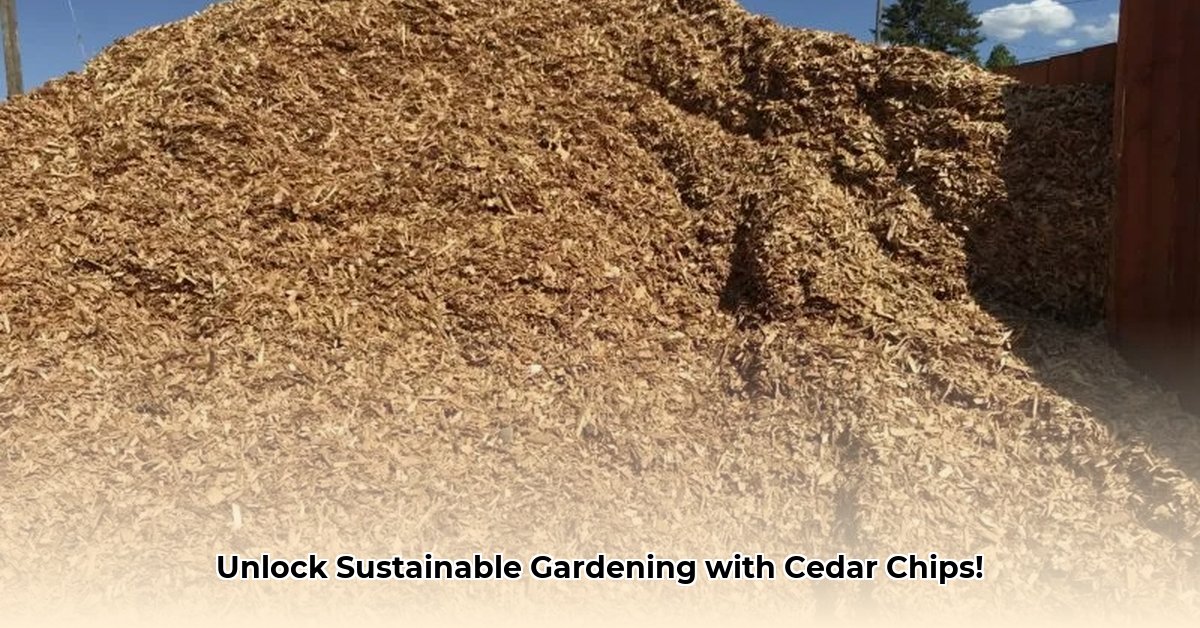
Cedar chips are gaining popularity among gardeners and farmers seeking sustainable solutions. Tractor Supply offers a readily available source, but are they the right choice for your sustainable practices? This guide explores the benefits, drawbacks, and best practices for using cedar chips, along with viable alternatives. For more on sustainable sourcing, check out this helpful resource on Tractor Supply options.
The Allure of Cedar Chips: Benefits for Your Garden
Cedar chips offer several advantages for sustainable gardening. Their excellent weed-suppressing qualities reduce the need for herbicides, a significant win for environmental health. Do you spend hours weeding? Cedar chips drastically reduce that time commitment.
Additionally, they improve soil moisture retention. This translates to less frequent watering, conserving water resources, especially crucial in drought-prone regions. "Reduced watering translates to significant water savings, especially in arid climates," notes Dr. Emily Carter, Soil Scientist at the University of California, Davis. This benefit is particularly appealing during summer's scorching heat.
Beyond these immediate benefits, cedar chips act as a slow-release soil conditioner. As they decompose slowly, they enhance drainage and aeration, leading to healthier root systems. Improved root health directly translates to healthier, more resilient plants. The enhanced drainage also helps prevent waterlogged conditions, a common problem leading to root rot.
Finally, a layer of cedar chips adds an aesthetically pleasing, natural appearance to any garden. This enhances the overall appeal of your garden space.
The Other Side of the Coin: Potential Drawbacks and Considerations
While cedar chips offer many benefits, potential drawbacks need careful consideration. The initial cost can be higher than alternatives like straw or composted yard waste. Furthermore, cedar contains natural oils that may temporarily inhibit the growth of delicate seedlings. While not universally problematic, it's a factor to consider when starting seeds or transplanting smaller, more sensitive plants. Start with a small test area to gauge your plant's reaction.
Moreover, improper use can disrupt the soil's nutrient balance over the long term. Maintaining a proper balance is vital for optimal plant health. If applied too thickly or left to decompose without regular replenishment, it could temporarily reduce nutrient availability.
Sustainable Practices: Sourcing and Using Cedar Chips Wisely
Responsible sourcing is paramount for environmentally conscious gardeners. Seek out Tractor Supply's cedar chips, or those from suppliers, that promote sustainable forestry practices. Look for certifications or labels confirming responsible harvesting methods.
When applying cedar chips, a 2-4 inch layer is generally sufficient. Think of it as a protective blanket for your soil, regulating temperature and moisture. Avoid piling them directly against plant stems to prevent rot and fungal growth. Remember, proper airflow around the base of the plant is crucial for its health.
Here's a step-by-step guide:
- Preparation: Clear the area of weeds and debris. This creates a clean base for the mulch.
- Application: Spread the cedar chips evenly, ensuring complete ground coverage.
- Maintenance: Replenish the layer as needed, typically once or twice a year, depending on decomposition rate, and weather conditions.
Exploring Alternatives: Beyond Cedar Chips
Numerous alternatives offer comparable benefits with varying levels of sustainability and cost.
- Shredded Hardwood Mulch: A budget-friendly option providing decent weed control and moisture retention. Local sourcing minimizes transportation costs and environmental impact. Consider contacting local tree services or arborists.
- Pine Bark Fines: Similar to cedar chips in effectiveness, but sustainability depends entirely upon the sourcing. Look for suppliers with responsible harvesting practices.
- Composted Leaves: A free, ultra-sustainable option. Gathering leaves provides a nutrient-rich mulch that is gentle on the environment. It may not be as effective at weed suppression as cedar chips.
Comparing Your Mulch Options: A Quick Look
| Mulch Type | Cost | Weed Control | Water Retention | Aesthetics | Sustainability Concerns |
|---|---|---|---|---|---|
| Tractor Supply Cedar Chips | Moderate | Excellent | Good | Excellent | Sourcing, potential oil toxicity |
| Shredded Hardwood Mulch | Low | Good | Moderate | Good | Local sourcing preferred |
| Pine Bark Fines | Moderate | Good | Excellent | Good | Sourcing crucial |
| Composted Leaves | Very Low | Moderate | Good | Moderate | Highly sustainable |
Making the Right Choice for Your Sustainable Garden
The ideal mulch depends on your budget, plant types, climate, available space, and sustainability goals. Experiment, learn from your experiences, and adapt your approach over time. Sustainable gardening is a continuous process of learning and refinement.